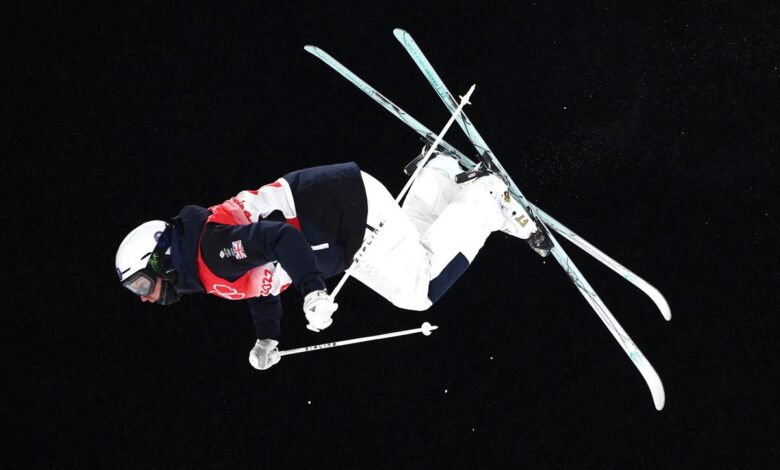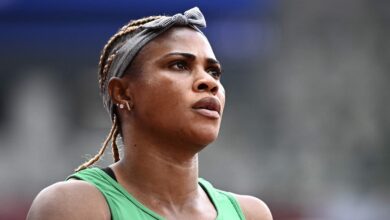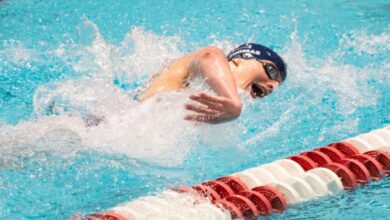‘There was blood all over the snow … it was terrifying’: How Winter Olympians fight the fear

The motto “never give up” would seem a little trite coming from most athletes, but freestyle skier Leonie Gerken Schofield has built her career living by those words. The 24-year-old’s body is covered in scars from surgeons’ scalpels: she has broken her back and suffered a herniated disc, undergone two knee operations and dislocated her shoulder three times which would eventually require surgery. The nadir came just before Christmas, only two months before the 2022 Winter Olympics in Beijing, when she crashed while training for a competition in the Alps. The physical injuries were relatively minor in Gerken Schofield’s world, but the psychological impact when competing days later was enormous.
“After my crash I had a check-up with a Team GB doctor to make sure I was OK – I took a hit on my shoulder and head – but it was all clear,” she tells The Independent. “Then I had a chat with my sports psychologist, I told her I wasn’t feeling it when I was at the top. The cameras, the conditions, the waiting all got to me. My legs started to shake, I was a complete nervous wreck.”
The following day Gerken Schofield had a meeting with her coaches and her psychologist as they tried to figure out a way to restore her confidence.
“I told them how I felt, how everything got to me, it was too much for me to cope with and I didn’t know how I was going to compete in the next days. But by the end of the meeting I’d learnt a lot about myself. I know that being on my own is not right for me and talking to my team about anything to keep my mind off skiing keeps me calm and relaxed – I’m a big over-thinker so anything to keep my mind occupied is good. I also took the chair lift up with the head coach of GB so I was never left by myself.
“The plan worked. I was at the start feeling confident. Of course the pressure came but it wasn’t the massive weight I’d put on my own shoulders on the first run, it was ‘good pressure’ and I just knew I was going to be fine.”
Psychological training and support has become more prominent in elite sport over the past decade, to the point where most Premier League football teams now have psychological expertise on site to rival their medical departments. For sports like skiing in which peril is an inherent obstacle to overcome and injury is an occupational hazard, having the confidence and trust in yourself to perform is vital not only for success but for your own safety. It was a point highlighted on the biggest stage by Simone Biles this summer when the all-conquering US gymnast pulled out of most of her Olympic events citing the need to protect her own mental wellbeing, and therefore herself. Biles’s stance showed the world it was OK to accept and discuss fear, just as you would a sprained ankle.
Despite the success of Gerken Schofield’s distraction technique in the Alps, she says fear is ultimately not something which can just be ignored or blocked out. “I think fear is something to embrace, to talk about whenever it pops up. At the end of the day, an athlete is a human being and it’s only normal fear can occur in a situation you’re not used to or not comfortable in.”
Sports psychologist Dr Martin Turner agrees. He has worked with elite teams and individuals and co-authored Tipping The Balance: The Mental Skills Handbook For Athletes, and says he finds confronting fear is often a more effective strategy than suppression.
“The danger with distraction is you keep pushing the issue to the side and an athlete never quite comes to terms with that fear of pain or fear of injury,” says Dr Turner, part of the Manchester Metropolitan University Institute of Sport. “If you keep saying ‘just think about something else’ then at some point it’s going to crop up and become an issue. What we do is actually get them to express their fears, to talk about them and then they can figure out where this fear is coming from.
“Often it’s not necessarily the fear of pain or the fear of injury, it’s usually fear of what the injury might mean – ‘I might not be able to compete and if I can’t compete, then I could drop out and if I drop out, then who am I?’ – and very quickly you understand that the fear is based in deeper ideas rather than only the injury and the pain itself.”
Fear is a relative thing. The fear of injury that most people would experience travelling down a snowy mountain at 60mph is not the same feeling for an athlete who has mastered their craft over a lifetime. Gradually their perception of danger shifts so that they almost become acclimatised to it, like Colombian cyclists raised at high altitudes who glide up the Alps of the Tour de France.
“Elite performers [in winter sports] would start off as a young athlete usually doing something relatively safe, and then as they develop into the adolescents and teens it gets quicker and more difficult,” says Dr Turner. “And so it’s a gradual process, and they build up and almost inoculate themselves against that fear of the actual pursuit itself.”
Even then, an elite athlete can have their confidence shredded in a single moment. Visually impaired skier Millie Knight is currently preparing for the Beijing Paralympics having won three medals four years ago in Pyeongchang, but she too was almost ruled out by an accident which tested her reserves of mental resilience. A year before the 2018 Games in Korea, Knight and her guide Brett Wild, whom she follows at high speed and communicates via a Bluetooth earpiece, were at the Paralympic test event when she crashed at the finish line.
“I tried to stop in one turn, which you can’t really do going 100 kilometres an hour,” Knight laughs. “I flipped and flipped and flipped and flipped and landed on my head three times. I dislocated my jaw and there was blood all over the snow. It was six months before I was back skiing. It was August and we flew to Chile and it was just horrendous. I did snow ploughs for a month because that was the only speed I could cope with. It was absolutely terrifying. The fear was just unimaginable.”
With the help of her support team including Team GB’s sports psychologist Kelley Fay, Knight gradually rebuilt her self-assurance. “She understood me as an athlete and as a person,” Knight says of Fay. “She knew when to challenge me, when to push me and when to just empathise and understand.” Fay recommended a hypnotherapist and Knight was initially sceptical. “A hypnotherapist?,” she thought. “What, he’s going to wave a clock in front of me? But it was unbelievable the way he reformatted my brain to make me think positively about crashes. He somehow made me laugh when thinking about my crash.”
Leonie Gerken Schofield crashes on her first run in Beijing
Gradually the people around Knight helped her embrace her adversity, and performance levels, and medals, soon returned. Fay in particular was key in making Knight believe in a triangle of trust – she trusted her guide Brett, who trusted her, which meant Knight should trust herself. “Kelley’s work was just unbelievable so I credit those results to her.”
Alongside the physical prowess required to be an Olympian, and the technical skills fine-tuned over many years, mental fortitude is equally crucial to sports performance and especially so at the Winter Olympics. Where once that might have been interpreted as showing no fear, increasingly it is about how you embrace it.
Gerken Schofield recovered from her crash before Christmas and made it to the start line in Beijing for last week’s moguls competition. It was an emotional time – her sister Makayla also qualified for Beijing but her twin brother Tom just missed out after suffering concussion – and her fears were realised when she crashed out of her first qualifying run. But, typically, she didn’t give up, and gathered herself to record a score at the second attempt and a creditable 17th placing. “I’m aware of the risks in my sport, it’s unfortunately part of the game and something you just have to embrace,” she says. “To be an elite athlete you have to accept challenges, and failures.”
Millie Knight and her guide Brett Wild compete at the Pyeongchang 2018 Games





